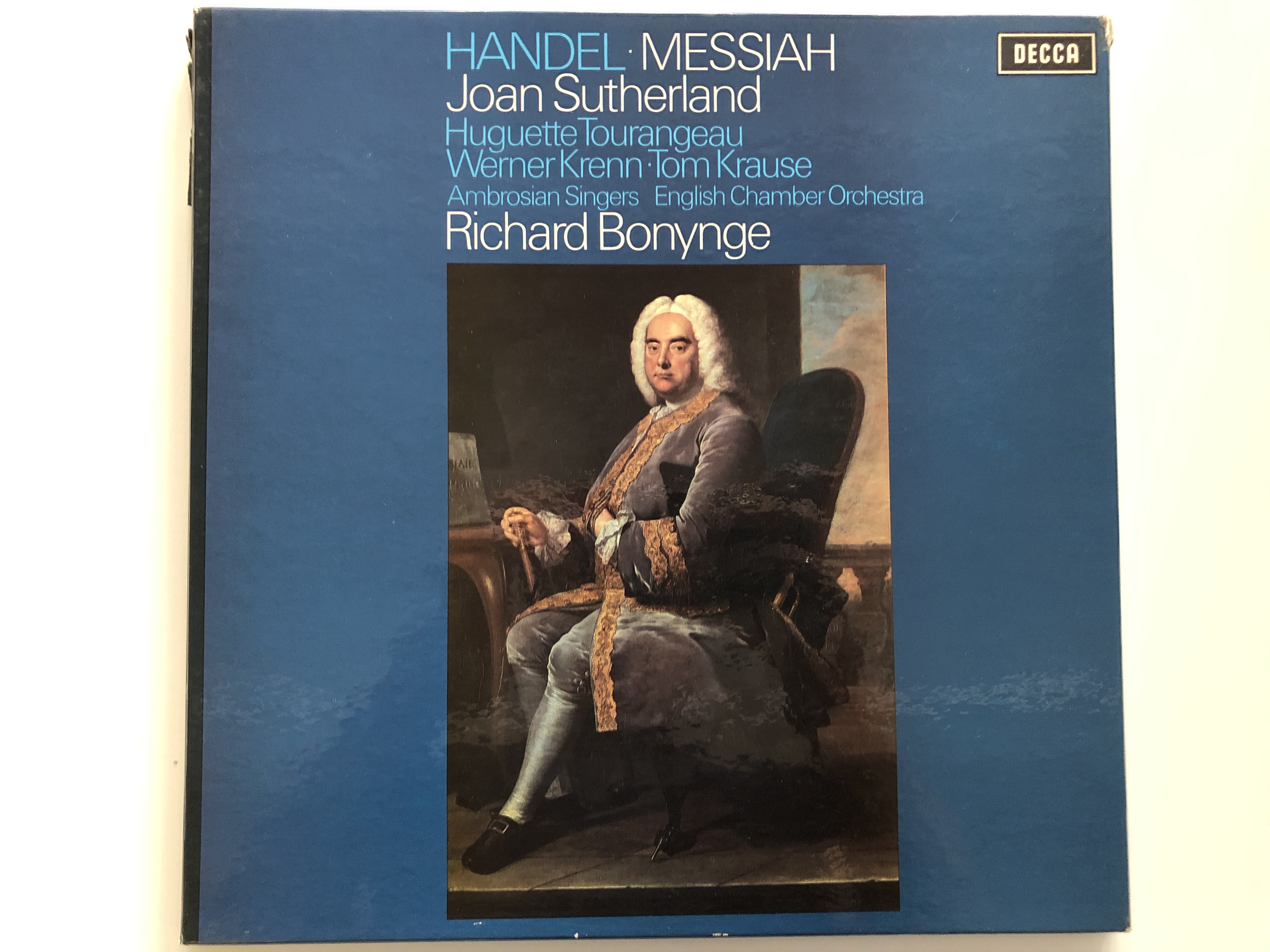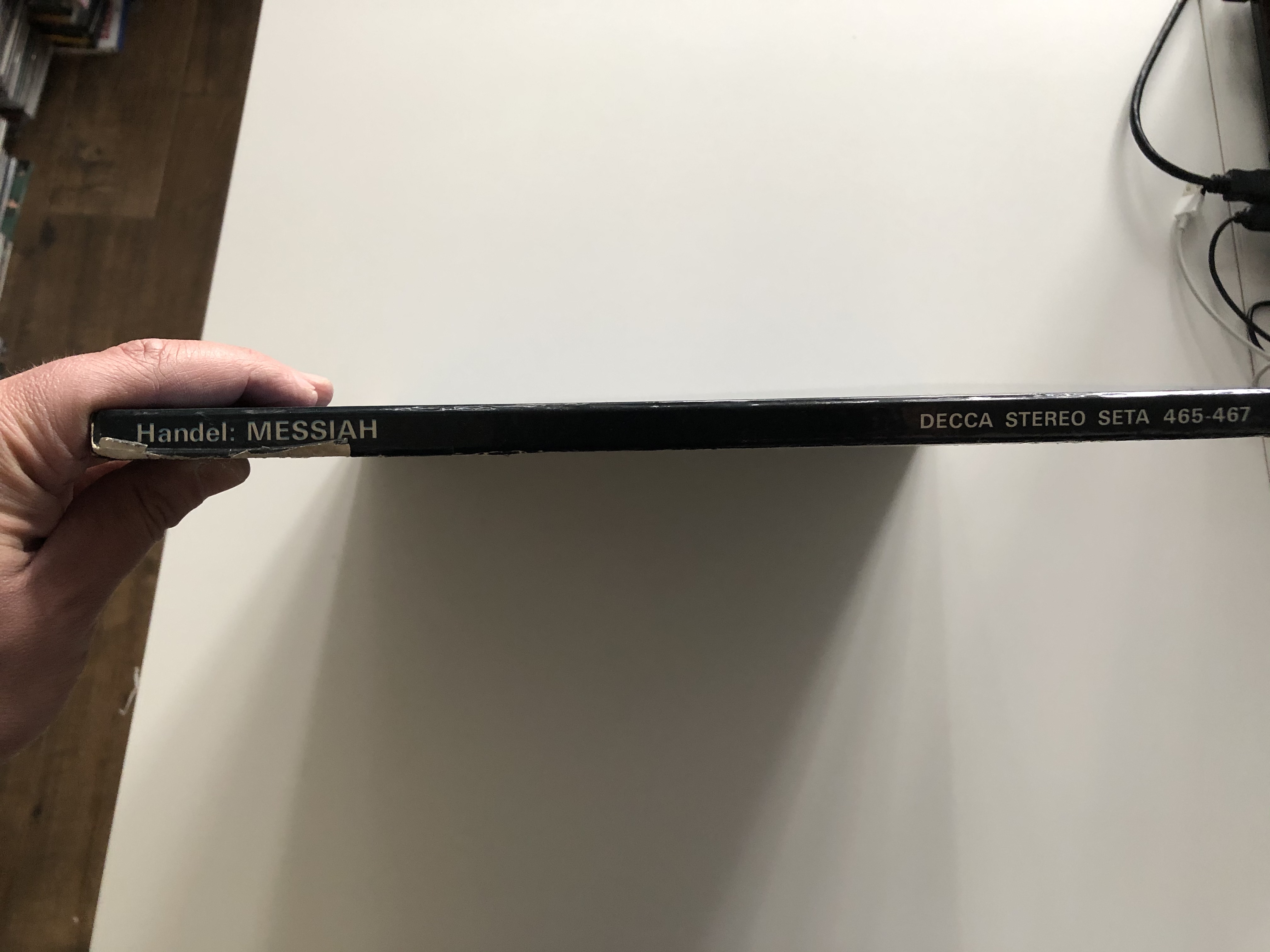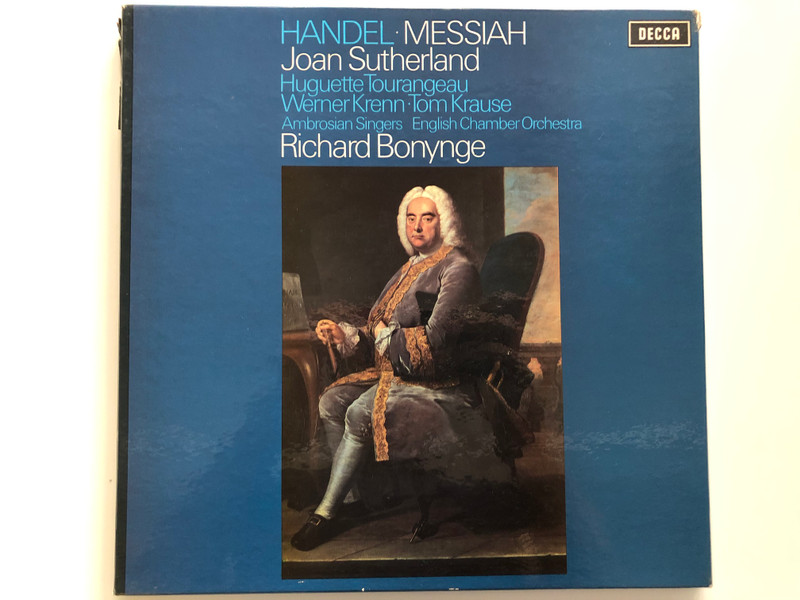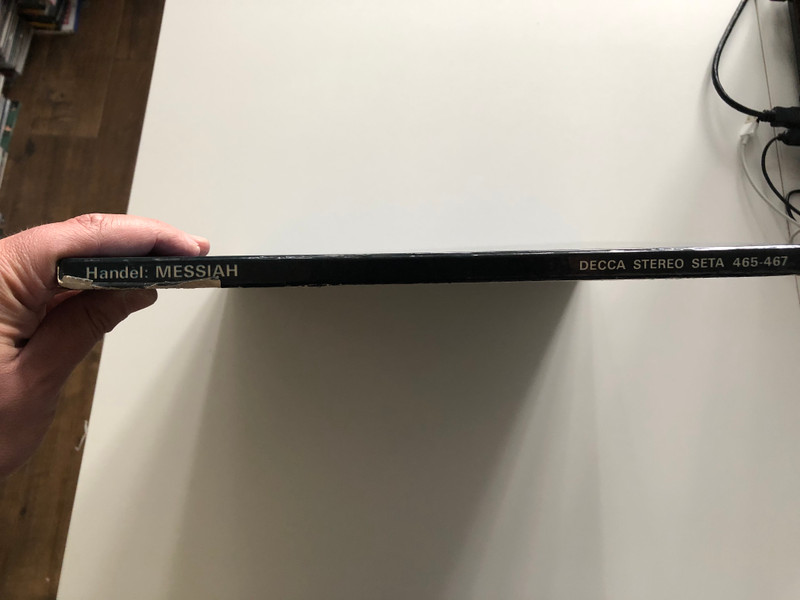Description
Handel - Messiah / Joan Sutherland, Huguette Tourangeau, Werner Krenn, Tom Krause, Ambrosian Singers, English Chamber Orchestra, Richard Bonynge / Decca 3x LP 1970 Stereo
SETA 465-467
Messiah (HWV 56) is an English-language oratorio composed in 1741 by George Frideric Handel, with a scriptural text compiled by Charles Jennens from the King James Bible, and from the Coverdale Psalter, the version of the Psalms included with the Book of Common Prayer. It was first performed in Dublin on 13 April 1742 and received its London premiere nearly a year later. After an initially modest public reception, the oratorio gained in popularity, eventually becoming one of the best-known and most frequently performed choral works in Western music.
Handel's reputation in England, where he had lived since 1712, had been established through his compositions of Italian opera. He turned to English oratorio in the 1730s in response to changes in public taste; Messiah was his sixth work in this genre. Although its structure resembles that of opera, it is not in dramatic form; there are no impersonations of characters and no direct speech. Instead, Jennens's text is an extended reflection on Jesus as the Messiah called Christ. The text begins in Part I with prophecies by Isaiah and others, and moves to the annunciation to the shepherds, the only "scene" taken from the Gospels. In Part II, Handel concentrates on the Passion and ends with the "Hallelujah" chorus. In Part III he covers the resurrection of the dead and Christ's glorification in heaven.
Handel wrote Messiah for modest vocal and instrumental forces, with optional settings for many of the individual numbers. In the years after his death, the work was adapted for performance on a much larger scale, with giant orchestras and choirs. In other efforts to update it, its orchestration was revised and amplified by, among others, Mozart (Der Messias). In the late 20th and early 21st centuries the trend has been towards reproducing a greater fidelity to Handel's original intentions, although "big Messiah" productions continue to be mounted. A near-complete version was issued on 78 rpm discs in 1928; since then the work has been recorded many times.
Tracklist:
| A1 | Overture | |
| A2 | Comfort Ye | |
| A3 | Every Valley Shall Be Exalted | |
| A4 | And The Glory Of The Lord | |
| A5 | Thus Saith The Lord | |
| A6 | But Who May Abide | |
| A7 | And He Shall Purify | |
| B1 | Behold, A Virgin Shall Conceive... O Thou That Tellest | |
| B2 | For Behold, Darkness Shall Cover The Earth | |
| B3 | The People That Walked In Darkness | |
| B4 | For Unto Us A Child Is Born | |
| B5 | Pastoral Symphony | |
| B6 | There Were Whepherds Abiding In The Field | |
| B7 | Glory To God | |
| B8 | Rejoice Greatly | |
| C1 | Then Shall The Eyes | |
| C2 | He Shall Feed His Flock | |
| C3 | His Yoke Is Easy | |
| C4 | Behold The Lamb Of God | |
| C5 | He Was Despised | |
| D1 | Surely He Hath Borne Our Griefs | |
| D2 | And With His Stripes | |
| D3 | All We Like Sheep Have Gone Astray | |
| D4 | All They That See Him... He Trusted In God | |
| D5 | He Trusted In God | |
| D5 | Thy Rebuke Hath Broken His Heart | |
| D6 | Behold And See | |
| D7 | He Was Cut Off... But Thou Didst Not Leave | |
| D8 | But Thou Didst Not Leave | |
| D9 | Lift Up Your Heads | |
| D10 | Unto Which Of The Angels... Let All The Angels Of God | |
| D11 |
Let All The Angels Of God | |
| E1 | Thou Art Gone Up On High | |
| E2 | The Lord Gave The Word | |
| E3 | How Beautiful Are The Feet | |
| E4 | Their Sound Is Gone Out | |
| E5 | Why Do The Nations So Furiously Rage Together | |
| E6 | Let Us Break Their Bonds Asunder | |
| E7 | He That Dwelleth In Heaven | |
| E8 | Thou Shalt Break Them With A Rod | |
| E9 | Hallelujah | |
| F1 | I Know That My Redeemer Liveth | |
| F2 | Since By Man Came Death | |
| F3 | Behold, I Tell You A Mystery... The Trumpet Shall Sound | |
| F4 | The Trumpet Shall Sound | |
| F5 | Then Shall Be Brought To Pass... O Death, Where Is Thy Sting? | |
| F6 | Oh Death, Where Is Thy Sting | |
| F7 | But Thanks To God, | |
| F8 | If God Be For Us | |
| F9 | Worthy Is The Lamb |
- Alto Vocals – Huguette Tourangeau
- Bass Vocals – Tom Krause
- Choir – The Ambrosian Singers
- Chorus Master – John McCarthy
- Composed By – Georg Friedrich Händel
- Concertmaster – Richard Bonynge
- Harpsichord – Valda Aveling
- Liner Notes – Charles Cudworth
- Orchestra – English Chamber Orchestra
- Organ – Brian Runnett
- Soprano Vocals – Dermot Coleman, Joan Sutherland
- Tenor Vocals – Werner Krenn




















